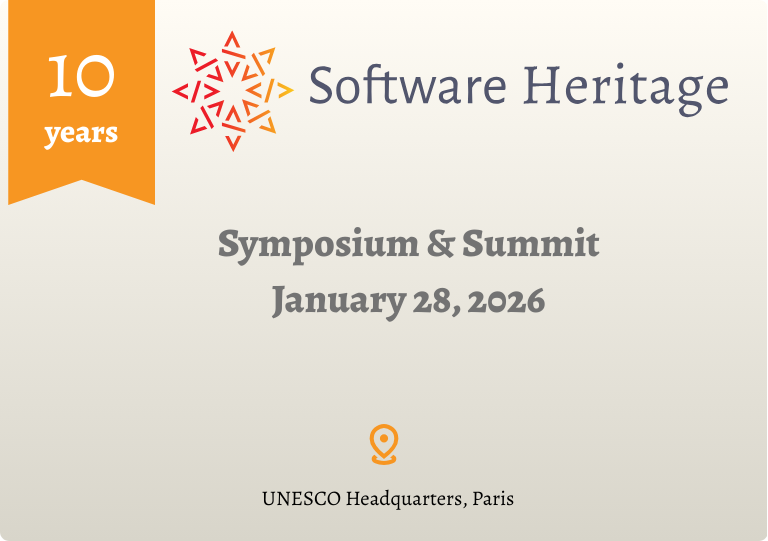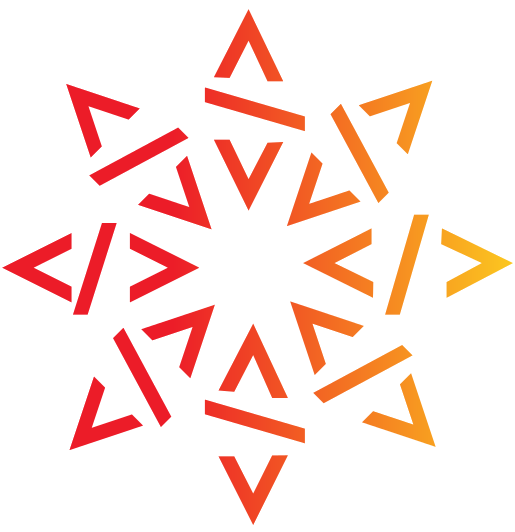Software Heritage 2026 Symposium and Summit

Software Heritage for Humanity
Preserving and leveraging source code as a Digital Public Good for a sustainable future
To mark the 10th anniversary of Software Heritage, UNESCO and Software Heritage will co-host the 2026 Symposium on January 28, 2026. This event will recognize software source code as a universal component of the knowledge commons and organize collective action for its long-term preservation and inclusive reuse.
Software Heritage has built a neutral, heritage-grade archive of global source code and advanced persistent, verifiable identifiers that anchor provenance, integrity, and citation. UNESCO complements this with a mandate to articulate shared principles, mobilize partnerships and build capacities for openness, connecting the Open Solutions portfolio with the UNESCO 2021 Recommendation on Open Science, 2019 Recommendation on Open Educational Resources, and the 2015 Recommendation concerning the Preservation of, and Access Documentary Heritage including in Digital Form as well as the UNESCO ROAM-X indicators that operationalize rights, openness, accessibility and multistakeholder participation.
The 2026 edition will serve as a moment to take stock of progress achieved over the past decade and to translate the lessons learned into an agenda for 2026–2030. It will bring together partners from across research, education, culture, the private sector, and public administration to consolidate a shared vision in which software preservation, citation, and reuse are integral to knowledge creation and dissemination. By fostering equitable participation, promoting multilingual access, and strengthening capacities, the Symposium will advance public access to information in line with SDG 16.10 and contribute to the implementation of the Global Digital Compact through more inclusive, open, and interoperable digital ecosystems
Through a joint effort pairing technical excellence with policy leadership, UNESCO and Software Heritage will sustain a code commons for key global needs, including reproducible science, lifelong learning, documentary heritage access, and trustworthy, transparent artificial intelligence.
This half-day event will:
- Mark the renewal and expansion of the UNESCO–Inria partnership on Software Heritage, reaffirming a shared commitment to preserve software source code as part of the world’s digital heritage, in line with the UNESCO 2015 Recommendation concerning the Preservation of, and Access to, Documentary Heritage, including in Digital Form and to advance its role in knowledge creation, education, and innovation.
- Position software as a Digital Public Good and an essential component of the global knowledge commons, promoting policies and practices that strengthen openness, interoperability, and long-term access across research, education, culture, public administration, and industry.
- Take stock of a decade of progress and launch the 2026–2030 joint agenda, connecting technical achievements—such as the Software Heritage archive, verifiable identifiers (ISO 18670), and heritage-grade preservation standards—with UNESCO’s Open Solutions frameworks to support equitable, multilingual, and sustainable digital ecosystems. (The term Open Solutions refers to UNESCO’s integrated policy and programme framework encompassing Open Access, Open Data, Open Educational Resources (OER), and Free and Open-Source Software (FOSS). It promotes openness as a foundation for inclusive knowledge societies, supporting transparency, collaboration and equitable access to information, in line with the UNESCO Recommendations on Open Science (2021) and on Open Educational Resources (2019).
- Strengthen the link between software preservation and open development by foregrounding Free and Open-Source Software (FOSS) as a foundation for sustainable innovation, transparency, and reuse. This includes promoting community-driven maintenance, open licensing, and procurement practices that enable public institutions and researchers to build on preserved code in the public interest.
- Examine how transparent and responsible uses of artificial intelligence, grounded in open and verifiable code archives, can advance digital inclusion, empower local innovation, and sustain cultural and linguistic diversity—thereby contributing to the implementation of the UNESCO 2021 Recommendations on Open Science, as well as SDG 16.10 on public access to information.
Key themes
Open infrastructures for software as a Digital Public Good (DPG)
Software underpins education, research, culture, public services, and industry. Treating it as a DPG requires open, non-commercial infrastructures that guarantee long-term access, provenance, and equity. This panel examines how to map and monitor the commons (catalogs, registries, observatories), how to make infrastructures interoperable (open APIs, shared schemas, content-addressable storage), and how to increase resilience through geodiverse mirrors and identifier standards such as ISO/IEC 18670 for verifiable citation and provenance. It will also explore compliance-enabling practices (licensing clarity, software bill of material (SBO) readiness) and public-private cooperation models that keep stewardship in the public interest while leveraging industry expertise and scale. Global code archives and mirror networks are referenced as neutral enablers that sit behind the scenes to serve science and society.
Supporting the digital commons and a resilience infrastructure
Sustaining the software commons requires predictable funding, independent governance, and clear division of roles across states, funders, research, industry, and international organizations. Building on the Open Science recommendation and evolving policy frameworks (e.g., AI Act, CRA, NIS2), this panel looks at governance models that secure the public-interest mission while enabling contribution at scale; multi-source funding mixes (baseline public support, philanthropy, in-kind, procurement); and resilience plans that guarantee continuity of access to software dependencies and research artifacts during outages or shocks, aligning with the objective of scientific reproducibility.
Free and Open-Source Software (FOSS) ecosystems form a cornerstone of this resilience, ensuring that preserved code remains usable, auditable, and adaptable through open collaboration. They demonstrate how community-led development and shared maintenance can complement institutional stewardship, strengthen trust, and sustain the commons as living public infrastructure.
Practical alignment with provenance/software bill of materials (SBOM) attestations and verifiable identifiers supports compliance and lowers systemic risk. Neutral global archives and mirror networks again serve as quiet plumbing for continuity and auditability.
Transparent AI for digital inclusion
AI can narrow the digital divide—if it’s built on traceable, well-licensed, and representative training resources. A Code Commons approach assembles high-quality, provenance-rich corpora that support transparent and efficient AI while honoring creators’ rights and enabling auditing and reproducibility. This panel centers on inclusion: enabling local language models, culturally relevant applications, and pathways for researchers and small and mid-sized businesses from the global south to participate. It links open code collections with education and capacity-building. It also highlights how neutral archives, identifier standards, and open tooling quietly make responsible AI possible without dominating the stage.
Code on show: A special exhibit
As part of the conference, an exhibit will place the spotlight on the untold stories embedded within source code, moving past its purely functional role. The exhibit will showcase code as a historical testimony, whether monumental, like the Apollo-11 lunar landing equations, or grassroots creations capturing the DIY spirit of early computing. Crucially, the focus extends to code as a mirror of society, revealing the biases, politics, and values of its time, rather than existing in a vacuum. Finally, the exhibit will invite appreciation of source code as a cultural artifact, exploring its expressive power, aesthetics, rhythms, and the unique artistic voice of its author, positioning it alongside traditional forms of human expression.
The project is organized by Mathilde Fichen (CNAM/Software Heritage), Titaÿna Kauffmann (University of Luxembourg), and Camille Picard (Inria). Furthermore, a distinguished Exhibition Committee—featuring experts from the Computer History Museum, Codexpo.org, Deutsches Museum, and other global institutions—was responsible for the essential tasks of reviewing proposals and curating the final display.
Program
The Symposium will take place as a hybrid public event at UNESCO Headquarters in Paris, following the Software Heritage Summit in the morning for contributors and partners.
The conference program is subject to change; speakers will be announced soon.
Registration details for this hybrid event will be announced shortly.
14:00–14:30 Opening ceremony — Renewal of Inria–Software Heritage Agreement and UNESCO partnership
14:30–15:30 Panel: Open infrastructures for software as a DPG
15:30–16:15 Coffee break
16:15–17:15 Panel: Supporting the digital commons and a resilience infrastructure
17:15–18:15 Panel: Transparent AI for inclusion
18:15–18:35 What’s next & closing remarks
18:35–19:15 Exhibition visit
19:15–22:00 Reception
